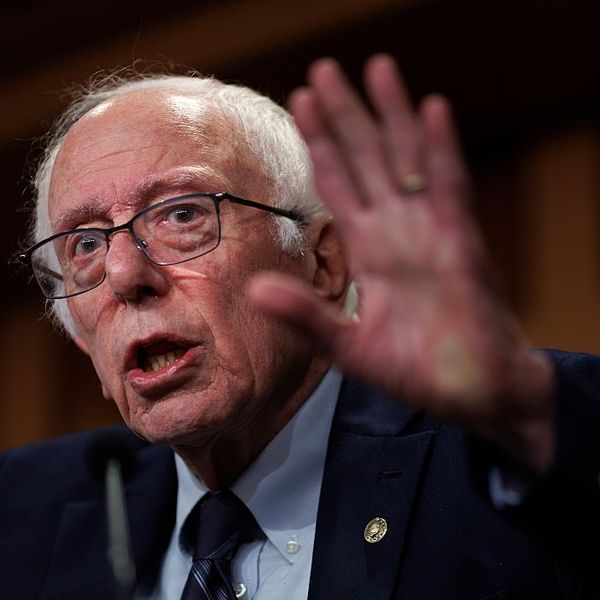The GOP's Sick Priorities
How deceptive for politicians to stress "entitlements" when they talk about gutting Social Security and Medicare, two programs long paid for by their beneficiaries. The Republicans make it sound as if they're doing us a favor, cutting government waste by seeking to strangle America's two most successful domestic programs.
How deceptive for politicians to stress "entitlements" when they talk about gutting Social Security and Medicare, two programs long paid for by their beneficiaries. The Republicans make it sound as if they're doing us a favor, cutting government waste by seeking to strangle America's two most successful domestic programs. And now Barack Obama seems poised to join their camp in undermining the essential lifeline for most of the nation's seniors, many of whom lost their retirement savings in the banking meltdown.

These threatened programs are not government handouts to a privileged class, like defense contractors and bailed-out bankers, who do feel eminently entitled to pig out at the federal trough. On the contrary, Social Security and Medicare have been funded by a regressive tax that falls disproportionately on working middle-class income earners, while caps in the system leave the wealthy--most notably the hedge fund hustlers who helped cause today's economic crisis--largely untaxed.
While there are many plausible ways to ensure the future of Medicare and Social Security--and extending a fair share of the burden to wealthier individuals is a good place to start--such changes should not be considered in the context of a bargain to raise the debt ceiling. These programs have nothing at all to do with a national debt that has spiraled out of control in the past four years as a result of untethered corporate greed. In that time the debt--already inflamed by two wars fought on the credit card while President George W. Bush cut taxes for the wealthy--rose a whopping 50 percent as a consequence of the deepest recession in 70 years, brought on by the banking collapse.
Indeed, the economic turmoil has put considerable pressure on these programs. In the past two years, expenditures for Social Security exceeded non-interest income for the first time since 1983, as the trustees of the fund reported the deficits "are in large part due to the weakened economy. ..." The interest earned on the more than $2.4 trillion in the Social Security trust fund held by the Treasury more than made up the shortfall, and the fund will be able to fulfill its projected obligations, even given the strain of the baby boomers' retirement, until 2036.
Social Security is a particularly weird whipping boy for what ails us, since the program has been solvent since its inception and will be so for the next quarter of a century. Is there any other public or corporate entity that we can guarantee will be in as good shape for the next 25 years, and even at that point be able to pay 75 percent of its obligations? Presidents both Republican and Democrat have routinely dipped into the Social Security trust fund to float the national debt, and yet critics from both parties have the effrontery now to treat as some sort of indulgence a program for which seniors, current and future, have paid. Seniors are as much "entitled" to the payback on their investment as the folks who buy Treasury notes, people who will be at the forefront of those protected by a rise in the debt ceiling.
Yes, there are more pressing issues with Medicare. Those have to do with cost containment in the medical industry, a situation aggravated when the Republican Bush expanded prescription drug coverage. Unfortunately, health care cost containment was not a serious focus of Obama's health care reform, and without a national policy alternative it is difficult to contain the cost for seniors who are medically the most needy and therefore the most vulnerable.
As with the problems of Social Security, the problems of Medicare can be dealt with handily by increasing payments from the wealthier segment of the population. A very limited effort in that direction was included in the Obama health care law, which requires a 0.9 percent increase in Medicare payments beginning in 2013 for couples earning more than $250,000.
Even more troubling than potential Medicare cuts is the threat to Medicaid, a program that provides health care to 68 million needy children, disabled individuals, pregnant women and poor seniors. These people are "entitled" to such aid only as a matter of government-recognized decency that has historically been supported by both Republican and Democratic presidents. That Obama is now even considering reducing support for the most vulnerable in the current harsh economy has brought written opposition from two-thirds of Senate Democrats.
It is absurd that Medicaid, along with Medicare and Social Security, is on the chopping block when there is no serious effort to find savings in a defense budget equal to that of the rest of the world's nations combined, and still at Cold War era levels despite the lack of a sophisticated military enemy. And that the GOP-led House has gotten a supposedly progressive president to consider doing serious damage to our most vulnerable population in order to placate Republicans determined to continue massive tax breaks for the wealthy is morally obscene.
An Urgent Message From Our Co-Founder
Dear Common Dreams reader, The U.S. is on a fast track to authoritarianism like nothing I've ever seen. Meanwhile, corporate news outlets are utterly capitulating to Trump, twisting their coverage to avoid drawing his ire while lining up to stuff cash in his pockets. That's why I believe that Common Dreams is doing the best and most consequential reporting that we've ever done. Our small but mighty team is a progressive reporting powerhouse, covering the news every day that the corporate media never will. Our mission has always been simple: To inform. To inspire. And to ignite change for the common good. Now here's the key piece that I want all our readers to understand: None of this would be possible without your financial support. That's not just some fundraising cliche. It's the absolute and literal truth. We don't accept corporate advertising and never will. We don't have a paywall because we don't think people should be blocked from critical news based on their ability to pay. Everything we do is funded by the donations of readers like you. Will you donate now to help power the nonprofit, independent reporting of Common Dreams? Thank you for being a vital member of our community. Together, we can keep independent journalism alive when it’s needed most. - Craig Brown, Co-founder |
How deceptive for politicians to stress "entitlements" when they talk about gutting Social Security and Medicare, two programs long paid for by their beneficiaries. The Republicans make it sound as if they're doing us a favor, cutting government waste by seeking to strangle America's two most successful domestic programs. And now Barack Obama seems poised to join their camp in undermining the essential lifeline for most of the nation's seniors, many of whom lost their retirement savings in the banking meltdown.

These threatened programs are not government handouts to a privileged class, like defense contractors and bailed-out bankers, who do feel eminently entitled to pig out at the federal trough. On the contrary, Social Security and Medicare have been funded by a regressive tax that falls disproportionately on working middle-class income earners, while caps in the system leave the wealthy--most notably the hedge fund hustlers who helped cause today's economic crisis--largely untaxed.
While there are many plausible ways to ensure the future of Medicare and Social Security--and extending a fair share of the burden to wealthier individuals is a good place to start--such changes should not be considered in the context of a bargain to raise the debt ceiling. These programs have nothing at all to do with a national debt that has spiraled out of control in the past four years as a result of untethered corporate greed. In that time the debt--already inflamed by two wars fought on the credit card while President George W. Bush cut taxes for the wealthy--rose a whopping 50 percent as a consequence of the deepest recession in 70 years, brought on by the banking collapse.
Indeed, the economic turmoil has put considerable pressure on these programs. In the past two years, expenditures for Social Security exceeded non-interest income for the first time since 1983, as the trustees of the fund reported the deficits "are in large part due to the weakened economy. ..." The interest earned on the more than $2.4 trillion in the Social Security trust fund held by the Treasury more than made up the shortfall, and the fund will be able to fulfill its projected obligations, even given the strain of the baby boomers' retirement, until 2036.
Social Security is a particularly weird whipping boy for what ails us, since the program has been solvent since its inception and will be so for the next quarter of a century. Is there any other public or corporate entity that we can guarantee will be in as good shape for the next 25 years, and even at that point be able to pay 75 percent of its obligations? Presidents both Republican and Democrat have routinely dipped into the Social Security trust fund to float the national debt, and yet critics from both parties have the effrontery now to treat as some sort of indulgence a program for which seniors, current and future, have paid. Seniors are as much "entitled" to the payback on their investment as the folks who buy Treasury notes, people who will be at the forefront of those protected by a rise in the debt ceiling.
Yes, there are more pressing issues with Medicare. Those have to do with cost containment in the medical industry, a situation aggravated when the Republican Bush expanded prescription drug coverage. Unfortunately, health care cost containment was not a serious focus of Obama's health care reform, and without a national policy alternative it is difficult to contain the cost for seniors who are medically the most needy and therefore the most vulnerable.
As with the problems of Social Security, the problems of Medicare can be dealt with handily by increasing payments from the wealthier segment of the population. A very limited effort in that direction was included in the Obama health care law, which requires a 0.9 percent increase in Medicare payments beginning in 2013 for couples earning more than $250,000.
Even more troubling than potential Medicare cuts is the threat to Medicaid, a program that provides health care to 68 million needy children, disabled individuals, pregnant women and poor seniors. These people are "entitled" to such aid only as a matter of government-recognized decency that has historically been supported by both Republican and Democratic presidents. That Obama is now even considering reducing support for the most vulnerable in the current harsh economy has brought written opposition from two-thirds of Senate Democrats.
It is absurd that Medicaid, along with Medicare and Social Security, is on the chopping block when there is no serious effort to find savings in a defense budget equal to that of the rest of the world's nations combined, and still at Cold War era levels despite the lack of a sophisticated military enemy. And that the GOP-led House has gotten a supposedly progressive president to consider doing serious damage to our most vulnerable population in order to placate Republicans determined to continue massive tax breaks for the wealthy is morally obscene.
How deceptive for politicians to stress "entitlements" when they talk about gutting Social Security and Medicare, two programs long paid for by their beneficiaries. The Republicans make it sound as if they're doing us a favor, cutting government waste by seeking to strangle America's two most successful domestic programs. And now Barack Obama seems poised to join their camp in undermining the essential lifeline for most of the nation's seniors, many of whom lost their retirement savings in the banking meltdown.

These threatened programs are not government handouts to a privileged class, like defense contractors and bailed-out bankers, who do feel eminently entitled to pig out at the federal trough. On the contrary, Social Security and Medicare have been funded by a regressive tax that falls disproportionately on working middle-class income earners, while caps in the system leave the wealthy--most notably the hedge fund hustlers who helped cause today's economic crisis--largely untaxed.
While there are many plausible ways to ensure the future of Medicare and Social Security--and extending a fair share of the burden to wealthier individuals is a good place to start--such changes should not be considered in the context of a bargain to raise the debt ceiling. These programs have nothing at all to do with a national debt that has spiraled out of control in the past four years as a result of untethered corporate greed. In that time the debt--already inflamed by two wars fought on the credit card while President George W. Bush cut taxes for the wealthy--rose a whopping 50 percent as a consequence of the deepest recession in 70 years, brought on by the banking collapse.
Indeed, the economic turmoil has put considerable pressure on these programs. In the past two years, expenditures for Social Security exceeded non-interest income for the first time since 1983, as the trustees of the fund reported the deficits "are in large part due to the weakened economy. ..." The interest earned on the more than $2.4 trillion in the Social Security trust fund held by the Treasury more than made up the shortfall, and the fund will be able to fulfill its projected obligations, even given the strain of the baby boomers' retirement, until 2036.
Social Security is a particularly weird whipping boy for what ails us, since the program has been solvent since its inception and will be so for the next quarter of a century. Is there any other public or corporate entity that we can guarantee will be in as good shape for the next 25 years, and even at that point be able to pay 75 percent of its obligations? Presidents both Republican and Democrat have routinely dipped into the Social Security trust fund to float the national debt, and yet critics from both parties have the effrontery now to treat as some sort of indulgence a program for which seniors, current and future, have paid. Seniors are as much "entitled" to the payback on their investment as the folks who buy Treasury notes, people who will be at the forefront of those protected by a rise in the debt ceiling.
Yes, there are more pressing issues with Medicare. Those have to do with cost containment in the medical industry, a situation aggravated when the Republican Bush expanded prescription drug coverage. Unfortunately, health care cost containment was not a serious focus of Obama's health care reform, and without a national policy alternative it is difficult to contain the cost for seniors who are medically the most needy and therefore the most vulnerable.
As with the problems of Social Security, the problems of Medicare can be dealt with handily by increasing payments from the wealthier segment of the population. A very limited effort in that direction was included in the Obama health care law, which requires a 0.9 percent increase in Medicare payments beginning in 2013 for couples earning more than $250,000.
Even more troubling than potential Medicare cuts is the threat to Medicaid, a program that provides health care to 68 million needy children, disabled individuals, pregnant women and poor seniors. These people are "entitled" to such aid only as a matter of government-recognized decency that has historically been supported by both Republican and Democratic presidents. That Obama is now even considering reducing support for the most vulnerable in the current harsh economy has brought written opposition from two-thirds of Senate Democrats.
It is absurd that Medicaid, along with Medicare and Social Security, is on the chopping block when there is no serious effort to find savings in a defense budget equal to that of the rest of the world's nations combined, and still at Cold War era levels despite the lack of a sophisticated military enemy. And that the GOP-led House has gotten a supposedly progressive president to consider doing serious damage to our most vulnerable population in order to placate Republicans determined to continue massive tax breaks for the wealthy is morally obscene.

